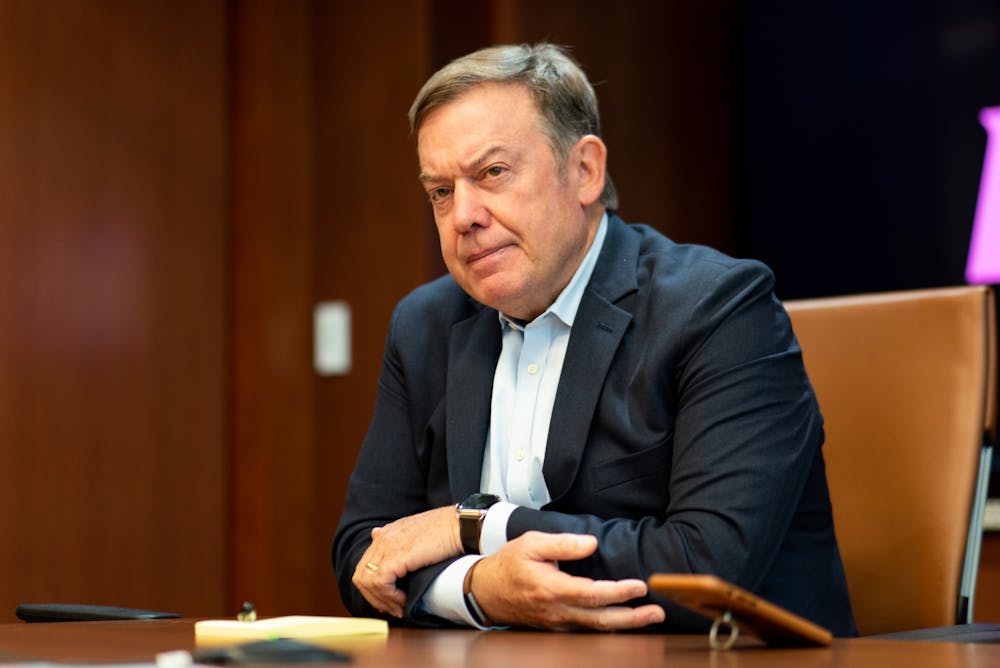ASU President Michael Crow supports the idea of universities having federal protection from COVID-19 lawsuits, according to an ASU spokesperson.
Crow's stance on the topic comes after other university leaders from around the country brought up the idea in a meeting with Vice President Mike Pence last week. According to a White House press release, the call, which included Crow, discussed an “all-of-America approach to respond to COVID-19 and drive America’s phased economic revival” and the “best practices to get students back to school in the Fall."
Inside Higher Ed reported that the university presidents in the meeting said in order to open comfortably, legal protection would be needed to protect universities from potential lawsuits if anyone is diagnosed with COVID-19 as the universities reopen. A University official confirmed to The State Press that Crow was in agreement with the others in regard to legal protection.
“President Crow does believe that there should be a safe harbor for schools that have acted in good faith to fulfill their educational mission while following the guidance of public health officials regarding appropriate health and safety precautions for their students, faculty and staff,” Katie Paquet, an ASU spokesperson, said in an email.
Legal protection from the government could potentially shield universities from being sued by those diagnosed with COVID-19, but only if the university has taken the necessary steps to ensure people's safety.
Thirteen other university presidents joined the call, along with Secretary of Education Betsy DeVos and White House Coronavirus Response Coordinator Dr. Deborah Birx, according to the White House.
University of Texas at El Paso President Heather Wilson, who participated in the meeting, told Inside Higher Ed that one thing the federal government can do to help colleges reopen is to provide “some kind of liability protection” from potential lawsuits.
Paquet said Crow talked about ASU's COVID-19 response and what the University needs to begin in-person instruction in the fall.
Crow said universities need clear guidelines from the Centers for Disease Control and Prevention about resuming on-campus instruction and said there should be regular COVID-19 testing protocols. Crow also stressed the importance of supporting international students during the pandemic, according to Paquet.
The day before Crow and other university presidents met with Pence, the U.S. Senate Judiciary Committee held a hearing on corporate liability during the coronavirus pandemic, which also touched on universities reopening.
“If the Senate wants universities to reopen in the fall … then we need your help,” Lee Tyner, general counsel at Texas Christian University, said in the hearing. “We need certainty that we could reopen without fear of liability for spread of the virus.”
Tyner added in his testimony that TCU does not seek “complete immunity or suggest protection from gross negligence or bad acts,” but rather it seeks protection from a “yet to be defined standard where the institution had complied with health orders and should not be exposed to liability claims related to illness.”
David Vladeck, a Georgetown University Law Center professor, testified later that only regulations and liability rules will protect citizens from “irresponsible conduct” and that even granting immunity to conduct that is not “reckless” or “gross” enables serious risk to workers and consumers.
“(Legal) immunity sends the message that precautions to control the spread of the virus is not a priority,” Vladeck said. “Even worse, immunity signals to workers and consumers that they go back to work, or go to the grocery store, at their peril.”
In March the CDC released guidance for the reopening of higher education institutions across the country which was also discussed in the meeting. The guidance had three categories on maintaining campus health based on transmission levels.
Community spread is the main determinant on how to respond to a case of COVID-19 on-campus, according to the CDC. The guideline offers a “decision tree” to assess the situation and how to respond. Options include a short class suspension with a closing of the exposed facility, possible contact tracing to determine who else has been exposed, or even a complete shutdown of a university.
ASU has announced they anticipate the University to resume on-campus instruction for the fall semester, but the exact details of that return are still being finalized, Paquet said.
In an update to students sent out April 30 regarding the fall semester, Crow said the University will continue to follow CDC guidelines and "implement whatever safety measures and health protocols are necessary to keep students and employees safe."
Fall semester will feature three learning modalities, on-campus, ASU Sync and ASU Online, to give students different options, Paquet said.
"We are doing the planning needed to conduct the fall term on the campus, but at the same time some modifications to the schedule will be needed to assure a safe campus environment," Paquet said in an email. "Our ultimate goal though, is to have as many options as possible for students. We know that some students are not going to be able to attend classes in-person due to COVID-19 related issues and we don’t want to lock anyone out.
"We want to make sure as many classes as possible are available to students in multiple modes – so if someone can’t attend in-person they’ll still have the option to attend via ASU Sync or ASU Online."
Clarification: This article was updated at 11 a.m. May 20 to clarify Crow's actions in the call with Vice President Pence. While Crow supports legal protection for universities, he did not explicitly advocate for it in the call, but other university leaders did.
Reach the reporter at wmyskow@asu.edu and follow @wmyskow on Twitter.
Like The State Press on Facebook and follow @statepress on Twitter.

Wyatt Myskow is the project manager at The State Press, where he oversees enterprise stories for the publication. He also works at The Arizona Republic, where he covers the cities of Peoria and Surprise.




